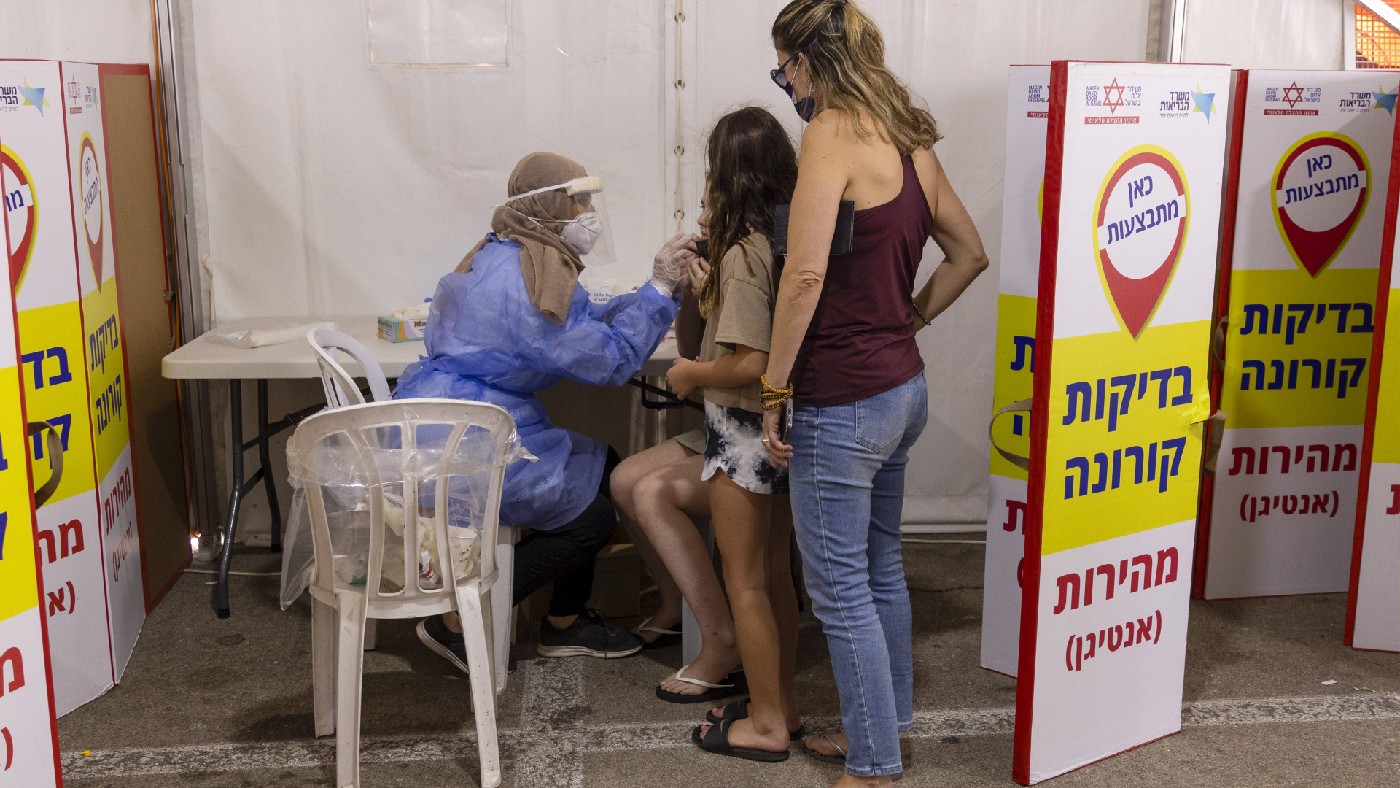‘Vaccination blunts, but does not defeat’: exploring Israel’s fourth Covid wave
Two months ago, face masks were consigned to bins. Now the country is in a ‘unique moment of epidemiological doubt’

A free daily email with the biggest news stories of the day – and the best features from TheWeek.com
You are now subscribed
Your newsletter sign-up was successful
Two months ago, Israel was basking in the success of one of the world’s fastest vaccine roll-outs. Masks were consigned to bins, and Covid restrictions looked like a thing of the past. No longer, said Anshel Pfeffer in Haaretz (Tel Aviv). Today, the country is in a “unique moment of epidemiological doubt”.
Fuelled by the spread of the Delta variant, new Covid cases have reached their highest levels in six months. And, despite 78% of adults having been double jabbed (about the same as in the UK), hospitalisations, serious illnesses and deaths have been “rising for the past seven weeks” – and are forecast to continue doing so for weeks to come.
Worryingly, 90% of new infections are in largely vaccinated over-50s, and nearly 60% of “gravely ill” patients are fully jabbed, said Meredith Wadman in Science (Washington). The situation is now being scrutinised around the world. And the lesson is clear: “Vaccination blunts, but does not defeat” the Delta variant.
The Week
Escape your echo chamber. Get the facts behind the news, plus analysis from multiple perspectives.

Sign up for The Week's Free Newsletters
From our morning news briefing to a weekly Good News Newsletter, get the best of The Week delivered directly to your inbox.
From our morning news briefing to a weekly Good News Newsletter, get the best of The Week delivered directly to your inbox.
So what’s behind this “stunning reversal” in Israel’s fortunes, asked Isabel Kershner in The New York Times. Some experts reckon high infection rates among early recipients point to “a waning of the vaccine’s protections” six to eight months after second jabs. The first cohort to be jabbed were also mainly older, with weaker immune systems to begin with. And Israel relied heavily on Pfizer’s mRNA vaccine, with a three-week gap between jabs; it remains to be seen whether immunity from other vaccines, such as Moderna’s or AstraZeneca’s, proves longer lasting.
Covid’s resurgence has led to tough questions for Naftali Bennett, said Maayan JaffeHoffman in The Jerusalem Post. Israel’s new PM was once so confident in his abilities that he wrote a book called How to Beat Covid-19. Yet two months after coming to power, he has been accused of being too slow to react to rising cases; restrictions on large gatherings, for instance, were only reinstated last week.
Israel is trying to quell its fourth wave by offering third jabs to over 40s, said Nature (London). More than a million out of 9.3 million Israelis have had a booster; other countries – including the UK, US and Germany – also plan to give third doses to at-risk groups. They shouldn’t. While 58% of people in the world’s high-income countries have had at least one dose, that figure is just 1.3% in poor nations. The priority for rich nations shouldn’t be giving booster jabs; it should be “getting the world vaccinated”. Until that happens, we’re all at risk from dangerous new variants that could knock the Covid recovery off course.
A free daily email with the biggest news stories of the day – and the best features from TheWeek.com
-
 The ‘ravenous’ demand for Cornish minerals
The ‘ravenous’ demand for Cornish mineralsUnder the Radar Growing need for critical minerals to power tech has intensified ‘appetite’ for lithium, which could be a ‘huge boon’ for local economy
-
 Why are election experts taking Trump’s midterm threats seriously?
Why are election experts taking Trump’s midterm threats seriously?IN THE SPOTLIGHT As the president muses about polling place deployments and a centralized electoral system aimed at one-party control, lawmakers are taking this administration at its word
-
 ‘Restaurateurs have become millionaires’
‘Restaurateurs have become millionaires’Instant Opinion Opinion, comment and editorials of the day
-
 Growing a brain in the lab
Growing a brain in the labFeature It's a tiny version of a developing human cerebral cortex
-
 A Nipah virus outbreak in India has brought back Covid-era surveillance
A Nipah virus outbreak in India has brought back Covid-era surveillanceUnder the radar The disease can spread through animals and humans
-
 Health: Will Kennedy dismantle U.S. immunization policy?
Health: Will Kennedy dismantle U.S. immunization policy?Feature ‘America’s vaccine playbook is being rewritten by people who don’t believe in them’
-
 Obesity drugs: Will Trump’s plan lower costs?
Obesity drugs: Will Trump’s plan lower costs?Feature Even $149 a month, the advertised price for a starting dose of a still-in-development GLP-1 pill on TrumpRx, will be too big a burden for the many Americans ‘struggling to afford groceries’
-
 Ultra-processed America
Ultra-processed AmericaFeature Highly processed foods make up most of our diet. Is that so bad?
-
 Covid-19 mRNA vaccines could help fight cancer
Covid-19 mRNA vaccines could help fight cancerUnder the radar They boost the immune system
-
 The quest to defy ageing
The quest to defy ageingThe Explainer Humanity has fantasised about finding the fountain of youth for millennia. How close are we now?
-
 The new Stratus Covid strain – and why it’s on the rise
The new Stratus Covid strain – and why it’s on the riseThe Explainer ‘No evidence’ new variant is more dangerous or that vaccines won’t work against it, say UK health experts